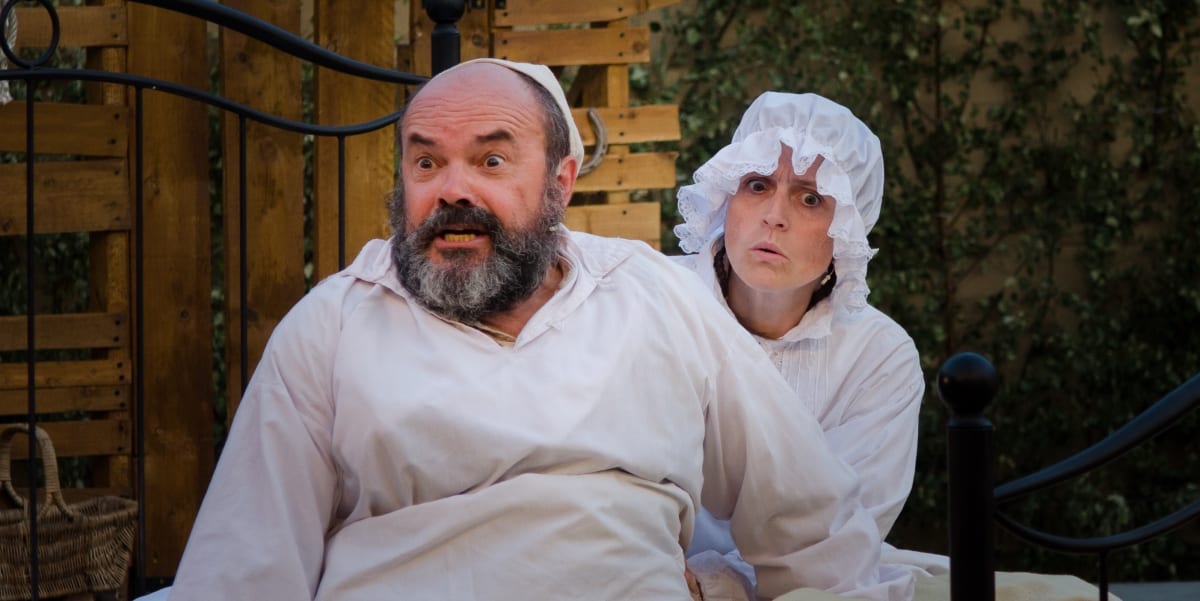From the first chords of ‘Tradition’ onwards, this production of Fiddler on the Roof gives you a sense of sliding back into the familiar. From the sheer amount of humming going on in the audience before and after the show, it is clear that it is hard to come to that well-loved musical without some prior knowledge of its content. This production by the Everyman Theatre in Cardiff, directed by Richard Tunley, is enlivened by a few quirks and a great choreography, but the sense that we are faced with a Classic rather than a fresh production still remains overwhelming at times. Secondly, while there is undeniable harmony in the choir, some of the key protagonists could have been portrayed with more energy.
Accused of ‘shtetl kitsch’ by a sharp-tongued Philip Roth, Fiddler on the Roof premiered as a musical in 1964, was made into a film in 1971, and has been reaping high acclaim and awards ever since. Its source material, Sholem Aleichem’s story Tevye the Dairyman, depicts pre-revolutionary Russia at the time of the pogroms, a series of anti-Jewish attacks that resulted in acts of destruction, assault, and violent assassinations. In the shtetl (a town inhabited by the Jewish communities) of Anatevka, Tevye (Paul Williams) lives in relative peace with his wife, Golde (Jo Herco-Thomas) and God – although he occasionally resents the latter for condemning him to a life of poverty. Tevye has five daughters, the three eldest of whom have reached marriageable age, putting him in the very delicate situation of finding a suitable match for each of them. Over the course of the show, we see Tevye gradually forced to relent as his progeny assert their independence in matters of love.
The scenes where the full cast, including over 60 actors, is onstage, often prove the most moving. During the village’s prayer (‘Sabbath Prayer’) we see one of the village women comfort Yente (Ayelet Levi-Brown), the matchmaker as she stands alone. Such small details evince a sense of community that makes the choir’s relative absence from the second act all the more noticeable, and the focus on sentimental intrigue rather less interesting in comparison. At times, in the spirit of ‘tradition’, we still see the other villagers huddled on the sides of the stage, ready to advance, like manifestations of Tevye’s subconscious watching his decisions. Even though ultimately it is hard to empathise with the dairyman and his compulsive upholding of conventions he does not even know the reason for, the night setting over the stage in Sophia Gardens gives such scenes a haunted air. The first act is jollier, including some impressive dancing: the bottle scene is very successful indeed. The choice of traditional costumes and the realistic, but minimal set, neither detract nor enhance the value of the whole production.

Some individual figures do stand out, starting with Golde: Jo Herco-Thomas’s superb singing voice gave her character added depth and warmth, while she also excelled at portraying Tevye’s ever-practical wife. Paul Williams’ Tevye has an almost pirate-y snarl that keeps his character more on the comedic side. Ayelet Levi-Brown shines through in her performance as Yente occasionally upending her character’s caricatural side with a note of pathos. The daughters, Tzeitel (Angelea Brabon), Hodel (Tamara Brabon) and Chava (Jemima Nicholas), all boast ravishing sopranos but were embodied with less strength in comparison. Their suitors often lacked intensity. This makes some songs like ‘Miracle of Miracles’, which celebrates a union between two lovers, fall quite flat, while ‘Matchmaker’, for example, could also be funnier. Overall, the protagonists’ uneven liveliness and a direction that seems to waver between the open sentimentality of the daughters’ pieces and a more haunted interpretation make this production occasionally inconsistent, rather than a strong take on the classic story.

